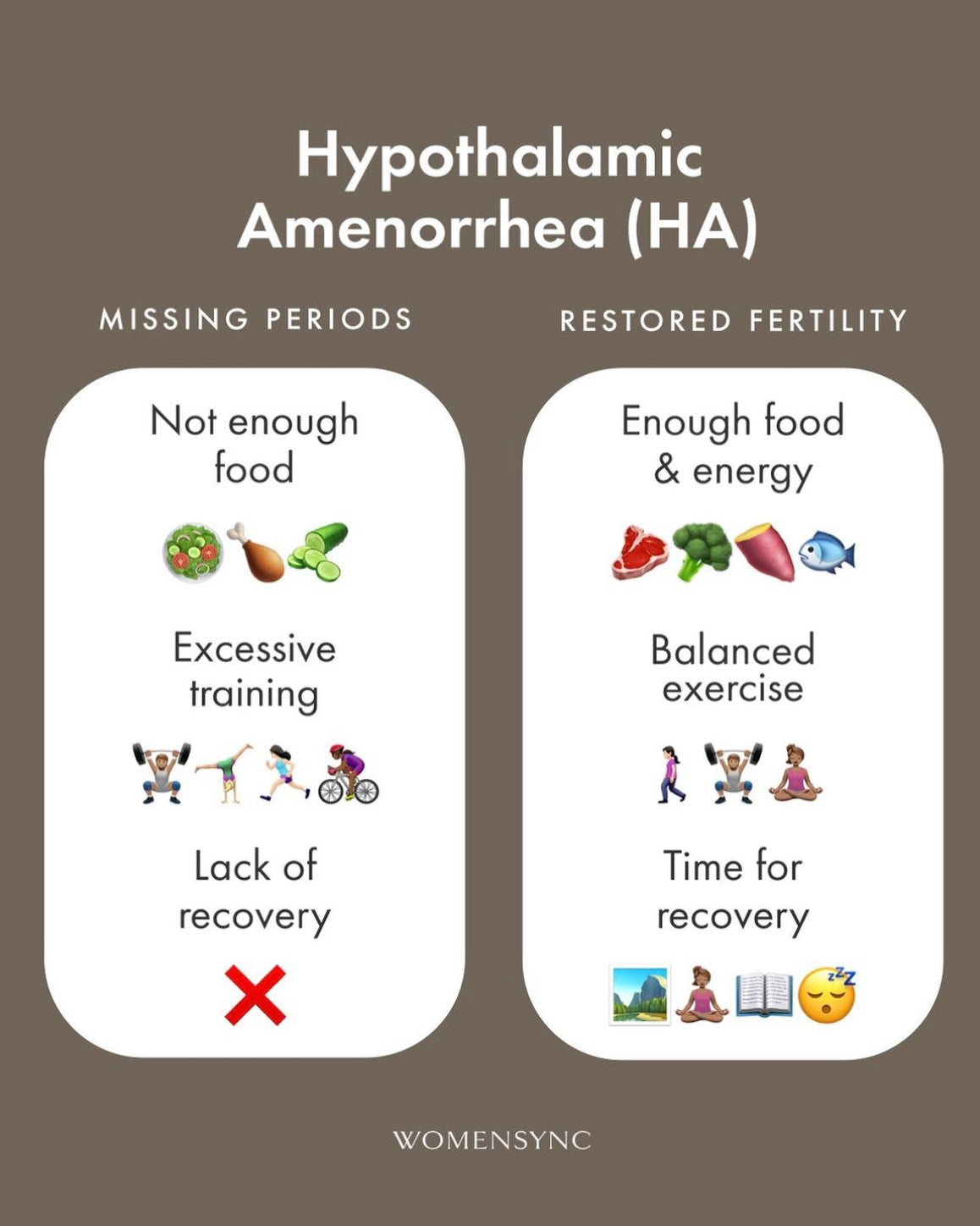Have you stopped taking birth control pills and your period shines with its absence? Do you try to chart your ovulation on LH sticks but never get a positive result? Have you gone months or even years without ovulating (and thus your period)? Then it could be that you have something called Hypothalamic Amenorrhea.
What does missed period and Hypothalamic Amenorrhea mean?
HA, the abbreviation of Hypothalamic Amenorrhea, is characterized by the absence of ovulation and menstruation for at least 6 months up to several years. It simply means that you have stopped ovulating and that you therefore also do not have a period. Your hypothalamus (a region of the brain) and your ovaries have sort of reached a deadlock (it sounds more dramatic than it is). This is caused by a problem in the hypothalamus and is the result of not getting enough energy and nutrition for a long time, overtraining and/or being exposed to a lot of stress (internal and external) in relation to recovery. This creates an imbalance between the hypothalamus, your ovaries, adrenal glands and your sex hormones. When this process is disrupted, it affects your sex hormones which can cause you to stop ovulating which in turn causes you not to get your period.
When you have HA, the hypothalamus is actually trying to protect you by not adding additional stress to your body - in the form of a pregnancy. The brain signals to your ovaries that it is not the right position for your body to carry a child.
Common signs of missed period/HA:
Anovulation – your ovaries do not release eggs.
Amenorrhea – you have not ovulated (or menstruated) for at least 6 months or more.
You have no fertile secretions - that is, no discharge which is a result of low estrogen.
What causes my missed period?
HA is a clear sign from your body that something is not right. When you stop ovulating for months, and maybe even years, your body tries to do everything it can to signal that something is not right in the form of various symptoms. When you are under extreme stress or are underweight (for your particular body), the body will prioritize removing additional stress (in the form of carrying a child) by shutting down ovulation. The body is wise and it will always prioritize survival , i.e. dealing with the stress, over fertility .
In general, HA could be divided into three different parts:
- Weight related
- Training related
- Stress related
Many women with HA usually have a combination of these three as it is often connected.
Weight related
In order to have a regular ovulation and menstrual cycle, a woman needs a certain degree of body fat . Exactly how much body fat we need varies from person to person. A study published in 2016 in the International Journal of Eating Disorders showed that women who had missed periods and were very low in body fat but gained weight and body fat percentage regained their ovulation and menstrual cycle. Many women who limit their eating in one way or another have an increased risk of missing ovulation and thus periods. If you have or have had any form of eating disorder such as anorexia, orthorexia, bulimia or have a dysfunctional relationship with food and exercise, the probability is greater that you may have or get HA.
Training related
It is well known that women who exercise at a high level may be at greater risk of missing periods as a result of hard training combined with not eating enough and at the same time being at a low body fat percentage. This means that many sports women simply use up more energy than they take in. What happens when you don't eat enough in combination with exercising extremely hard is that the body doesn't feel safe. It's like expecting your car to go twice as far as you have gas for - it's not possible. Whether you consider yourself an "athlete" or not, exercising several times a week or even several hours a day without giving your body what it needs will shut down your menstrual cycle.
A study highlighted in the book The Fifth Vital Sign by Lisa Hendrickson-Jack found that 70% of female athletes reported having irregular cycles, 21% had amenorrhea, and 44% used birth control pills to regulate their menstrual cycle. Many women think that losing their period is normal, but it is neither normal nor healthy. Exercising hard can be another stress for the body, but what research has shown is that it doesn't always have to be about the exercise itself, but that you take in too little in relation to what you get rid of (regardless of whether it's consciously or unconsciously) .
Stress related
Stress has an incredible impact on the menstrual cycle. If you have HA, it's likely to be caused by a combination of stress (internal and external), overtraining, and not eating enough. Both overtraining and eating too little can be experienced as stress by the body, which is important to know when talking about stress. Overtraining can put the body in fight or flight mode and the body sees not getting enough food as a threat to survival. A study published in 1990 in The Journal of Clinical Endocrinology & Metabolism showed that women with HA had significantly higher levels of the stress hormone cortisol than women with regular cycles. This is not surprising considering that both overtraining and too little food are a form of physical stress for the body. This in combination with other elements such as feelings of not being enough, stress around food and body, challenges in a relationship or not liking oneself leads to large amounts of stress. Therefore, in a healing process from HA, it is important to find tools and strategies to deal with the stress you experience.
Effects of missed ovulation and menstruation
Absence of ovulation and menstruation can have a number of negative effects on health such as increased risk of osteoporosis, hormonal imbalances and difficulty in becoming pregnant. Hormonal imbalances can manifest in many different ways in the form of brain fog, fatigue, difficulty sleeping, extreme hunger (linked to the hunger hormones ghrelin and leptin), thyroid problems, hair loss, accelerated aging, worsening PMS symptoms and much more. Having ovulation (which is the main event in the menstrual cycle) is therefore crucial for hormones in balance and a functioning menstrual cycle. The longer you are without your period, the greater the risk of one day suffering from osteoporosis or other symptoms linked to this. Therefore, it is important to address this as soon as possible. It will also bring many other positive health effects both physically, emotionally and mentally when you get back a regular and functioning menstrual cycle.
Here you can read more about how you can get back your missed ovulation and period through lifestyle change and thus get a regular menstrual cycle in a natural way. In that blog post, we delve into what lifestyle changes can be beneficial to getting your bike back on track.
Tips for other posts within the same theme:
High-intensity training and running linked to the menstrual cycle with Jenny Koos
How lifestyle factors such as caffeine, too little food and veganism can affect the menstrual cycle with Jenny Koos
Podcast Episode #5 with Susanna: Missed Menstruation, Lifestyle Change and Holistic Health .
Note: This blog post is for educational purposes. It is not intended to diagnose, treat or cure. If you have health problems, it is important to discuss them with an expert. We work closely with the Livakliniken , which is run by one of Womensync's external experts, Maria Särén, where you can turn if you are looking for advice. Please state "Womensync" when booking.

References in the text
BILLER, B., FEDEROFF, H., KOENIG, J. and KLIBANSKI, A., 1990. Abnormal Cortisol Secretion and Responses to Corticotropin-Releasing Hormone in Women with Hypothalamic Amenorrhea. Obstetrical & Gynecological Survey , [online] 45(7), pp.472-474. Available at: < https://doi.org/10.1210/jcem-70-2-311>.
Winkler, L., Frølich, J., Schulpen, M. and Støving, R., 2016. Body composition and menstrual status in adults with a history of anorexia nervosa-at what fat percentage is the menstrual cycle restored? . International Journal of Eating Disorders , [online] 50(4), pp.370-377. Available at: < https://doi.org/10.1002/eat.22600 >.
Other references
Beals, K. and Hill, A., 2006. The Prevalence of Disordered Eating, Menstrual Dysfunction, and Low Bone Mineral Density among US Collegiate Athletes. International Journal of Sport Nutrition and Exercise Metabolism , [online] 16(1), pp.1-23. Available at: < https://doi.org/10.1123/ijsnem.16.1.1 >.
Chou, S. and Mantzoros, C., 2018. Bone metabolism in anorexia nervosa and hypothalamic amenorrhea. Metabolism , [online] 80, pp.91-104. Available at: < https://doi.org/10.1016/j.metabol.2017.10.009 >.
Cialdella-Kam, L., Guebels, C., Maddalozzo, G. and Manore, M., 2014. Dietary Intervention Restored Menses in Female Athletes with Exercise-Associated Menstrual Dysfunction with Limited Impact on Bone and Muscle Health. Nutrients , [online] 6(8), pp.3018-3039. Available at: < https://doi.org/10.3390/nu6083018 >.
Meczekalski, B., Katulski, K., Czyzyk, A., Podfigurna-Stopa, A. and Maciejewska-Jeske, M., 2014. Functional hypothalamic amenorrhea and its influence on women's health. Journal of Endocrinological Investigation , [online] 37(11), pp.1049-1056. Available at: < http://10.1007/s40618-014-0169-3 >.
Books
The Fifth Vital Sign by Lisa Hendrickson-Jack

